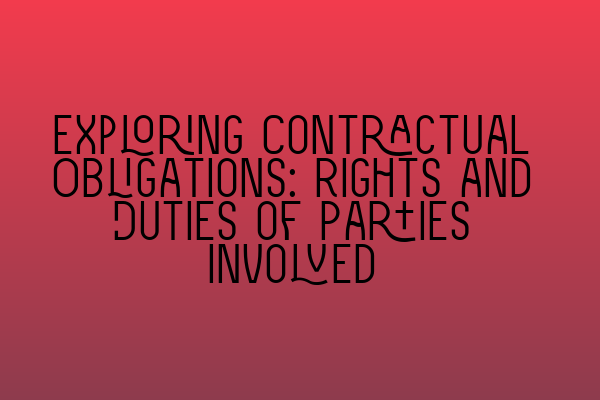Exploring Contractual Obligations: Rights and Duties of Parties involved
Contracts are the backbone of business transactions and legal agreements. They provide the framework within which parties can engage in various activities and ensure that everyone involved understands their rights and responsibilities. In this article, we will delve into the concept of contractual obligations and explore the rights and duties of parties involved.
Before we proceed, it is essential to have a clear understanding of what contractual obligations entail. Contractual obligations refer to the duties and responsibilities that each party involved in a contract must perform or fulfill to ensure the contract’s validity and enforceability.
The Importance of Clearly Defined Obligations
Having clearly defined obligations is crucial for the smooth functioning of any contract. It helps in avoiding misunderstandings, disputes, and potential legal challenges. When parties have a clear understanding of their rights and duties, they can negotiate and enter into contracts with confidence.
For instance, let’s consider a contract for the sale of goods. The buyer has the right to receive the goods as described and agreed upon, while the seller has the duty to deliver the goods within the specified timeframe and in the promised condition. If either party fails to fulfill their obligations, it can lead to breaches, legal disputes, and potential damages.
The Rights of Parties involved
Understanding the rights granted by contractual obligations is essential for parties involved in a contract. Here are some common rights:
- The right to receive the agreed-upon consideration: Each party has the right to receive what was promised to them in the contract. This can include payment, goods, services, or any other form of consideration.
- The right to enforce the terms of the contract: If one party fails to fulfill their obligations, the other party has the right to take legal action to enforce the terms of the contract or seek remedies for any damages suffered.
- The right to terminate the contract: In certain circumstances, such as a breach of contract or frustration of purpose, parties may have the right to terminate the contract. Termination can release parties from further obligations and seek remedies for any damages suffered.
The Duties of Parties involved
Along with rights, parties involved in a contract also have specific duties to fulfill. Here are some common duties:
- The duty to perform as agreed: Each party has an obligation to perform the tasks and responsibilities agreed upon in the contract. This can include providing goods, rendering services, making payments, or any other agreed-upon action.
- The duty of good faith and fair dealing: Parties must act in good faith and deal fairly with each other. They should not engage in fraudulent or deceptive practices that could harm the other party or invalidate the contract.
- The duty to mitigate damages: If one party suffers damages due to a breach of contract by the other party, they have a duty to mitigate those damages. This means taking reasonable steps to minimize the harm caused by the breach.
Conclusion
Contracts lay the groundwork for business transactions and legal agreements. Understanding the rights and duties of parties involved in a contract is crucial for successful contract execution and enforcement. Clearly defined obligations ensure that each party knows what is expected of them and helps prevent disputes and legal challenges.
If you found this article informative, you may also be interested in these related articles:
- Mentorship for Aspiring Solicitors: Nurturing Talent in the Legal Field
- Legal Challenges and Pitfalls: Navigating the Complexities of the Legal System
- The GDL (Graduate Diploma in Law): A Pathway to Becoming a Solicitor
- Mastering the Solicitor’s Path: Prepare for the Journey Ahead
- The Benefits of Becoming a Solicitor: A Rewarding Career
